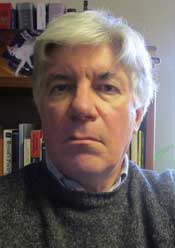Four Poems — William Doreski
THE POEM OF AIR
Writing on the edge of things
amuses and fulfills me.
I begin with black ink scribed
on the edge of chunks of slate
and microscopic cuneiforms
etched on the edge of yellow
legal sheets torn from a pad.
Having established the limits
of a legible holograph
I write something as important
as a Henry James novel
and with a large gesture splash it
on the misty horizon where
sea edge and sky edge consort.
No one reads it, though: too busy
at the beach watching two-piece
swimsuits wobbling in the glare
or noshing ungainly hot dogs
or peering into smartphones
where the buzz of life continues
without the bother of the flesh.
So next I write on both leading
and trailing edge of the wing
of a jetliner headed for Peru.
It will pass above Machu Picchu
and shed into the atmosphere
the script of the poem of air
to which everyone aspires.
As I watch the plane depart
in a streak of fluffy vapor
I wonder if ghosts of the Inca
will read my work in the spirit
of universal joy, or dismiss
my scrawl as just more ash shed
by a self-cremating world.
BOSTON SALVAGE
At Boston Salvage we open
at seven to allow the riffraff
to sell us the junk they glean
from Back Bay alleys or steal
from parked cars on Beacon Hill.
Furniture, rugs, clothing, cell phones,
laptops, power tools, copper pipes
liberated from construction sites.
By nine the public has arrived
to bargain. The same dry faces
differently framed. The hot light
of June complicates by casting
shadows through chain-link fencing
to crosshatch expressions and render
everyone a little suspicious
of us, each other, and the world.
Machines from ruined factories,
car parts, lumber stacked outdoors
embellish the intersection
of matter and spirit. From here,
in front of our prefab warehouse,
you can spot the domes and steeples
of famous churches glooming
in the past they helped deform.
You can also count the skyscrapers
marching along Boylston Street,
down through the financial district
toward the harbor where seabirds drift
on the chop and drunken yachtsmen
try to seduce bikinis they’ve bribed
by flapping their sails and boasting
of salaries larger than Texas.
We at Boston Salvage avoid
any hint of sex in our dealings.
No checks, no credit cards: cash
only, don’t ask for an invoice
or receipt. The thick days simper
into dusk the color of dust-storms.
Goods come and go. We pocket
cash for groceries and liquor
and lock the guard dogs in the yard.
Tomorrow will bloom a moment,
splendid with chicory and phlox,
then wither, and the same old trash
will recycle through the premises
like our second or third childhoods,
fourth or even fifth marriages: doomed
by languor, indifference, and rust.
BLUE PENCIL
Sharpening a blue pencil
instead of a red or yellow one
I feel professional although
I profess no special profession.
Technicians in white lab coats
always choose blue pencils.
Attorneys pouring over law books
also prefer blue pencils.
Yellow pencil for schoolkids.
Red pencils for scrawling poison
pen letters to taunt police.
The shavings accumulate. The point
looks eager to kill. I empty
the debris into the wastebasket
and set it afire. A wisp of smoke
and it’s gone. The pencil stabs
at the sky, punching a little hole
through which even more blue leaks.
If I’d sharpened a red pencil
I’d have to stab myself to spill
a little red into the world.
If I’d sharpened a yellow one
I’d have to poke a summer squash
and allow greasy little seeds
to weep into common ground and sprout.
Maybe I should just write something
rather than wield a weapon.
Maybe I should write something fresh
and then erase it before demons
copy it into their textbooks.
I punctuate the sky once more,
then settle to work with a brisk
yellow legal pad, the blue words
flowing like a genealogy
in a scrawl only slightly mussed
by plowing through little puddles
of that seepage from above.
LIKE AN EXISTENTIALIST
After you crumpled me up
and tossed me like a soiled tissue
I crept to the edge of the flat earth
and peered into the vacuum
from which creatures like me evolved.
Stars fizzled and became black holes.
Spaceships collided in bursts
of shrapnel, spilling their crews
into bottomless places beyond
the boundary of the creation.
Now I’ve seen so much dark
I’m no longer afraid of your fits
and moods, your expression rumpled
to intimidate. Living alone,
sleeping in weeds by the roadside,
suits me. Collecting bottles
to redeem for nickels and dimes
provides exercise and cash
for apples, bananas, yogurt
in little cups. I could live like this
long enough for you to tire
of your Manhattan condo
with its view of the Hudson
and the sprawl of America beyond.
Eventually I’ll decay enough
to topple into a drainage ditch
and pull the ballast over myself.
You won’t feel the universe ripple,
but you’ll notice that buzzing
in your ears, faint and distant, has stopped.
When I’ve distilled to my essence
I’ll rise like an existentialist
and stand at the foot of your thirty
floor building and stare up so hard
you’ll think lightning struck somewhere,
a white flash exposing your bones.
William Doreski recently retired after years of teaching at Keene State College in New Hampshire (USA). His most recent book of poetry is The Suburbs of Atlantis (2013). He has published three critical studies, including Robert Lowell’s Shifting Colors. His essays, poetry, fiction, and reviews have appeared in many journals.
